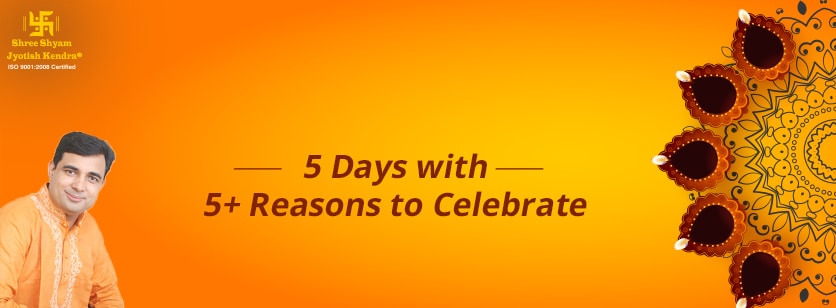
Diwali is one festival that evokes great joy and excitement in each and every one of us. The dazzling lights, bright & loud firecrackers, and the tempting sweets make Diwali the most favorite and awaited festival. It is observed during the 15th day of Kartika, the holiest month in the Hindu lunar calendar.
Diwali owes its origins to the Indian epic Ramayana which gives a very detailed and illustrious account of Diwali, i.e., the day when people of Ayodhya celebrated the return of their beloved son Ram, his wife Sita, and his brother Laxman from a 14-year exile. It is said that a grand feast was held, and the entire city of Ayodhya was bathed with light emanating from innumerable rows of Diyas arranged all over the city. However, Diwali is not a one-day affair but a 5-day long festival, and each day has its unique significance. Let’s take a closer look at what each of these mean and the various customs and rituals associated with them.
Day1: Dhanteras
The first day of Diwali signifies wealth, health, and prosperity. It is believed that on this day, Goddess Lakshmi first appeared from the churning of the ocean. Hence, it is an important ritual to buy new utensils, jewelry, silver-gold coins, etc. on Dhanteras.
It is also believed that Lord Dhanvantari, the father of Ayurveda, was born on this day. Lord Dhanvantri was one of the many incarnations of Vishnu who gifted Ayurveda to mankind. In many parts of India, people offer prayers and seek blessings from Lord Dhanvantri during Dhanteras.
Day2: Narak Chaturdashi
The second day is the Narak Chaturdashi or Choti Diwali. The demon king Narakasura was killed by the Goddess Kali and Lord Krishna on this day. In some states of India, effigies of Narakasura are burnt to commemorate the victory. It is considered very auspicious to take a bath before sunrise on Choti Diwali.
Also, there is an age-old tradition of throwing away old useless stuff on the second day of Diwali. It is believed that Goddess Lakshmi herself visits every home during Diwali night and showers prosperity and wealth upon those who have a neat and clean house.
Day 3: Amavasya or Lakshmi Pooja
The third and also the most important day is the Amavasya or the New moon. It is the day when the Diwali celebrations reach their full zenith. The whole of India dazzles in a unique hue with millions of Diya and thousands of decorative lights. In North India, people worship Goddess Lakshmi on this day. But in states like West Bengal, Odisha and Assam Kali Puja is performed. People dress up in new clothes, light firecrackers, exchange sweets, and stay awake the whole night to welcome Goddess Lakshmi, the creator of wealth and prosperity.
Day 4: Chaudas
The fourth day or Chaudas is observed differently in different states. In North India, the day is particularly auspicious as it commemorates the victory of Lord Krishna over Indra, the God of rain. It is said that on this Lord Krishna had lifted the famous Mount Govardhan on his little finger to save his people from Indra’s rage.
In South India, people celebrate the fourth-day as Bali Pratipadā to celebrate the return of Asura king Bali on earth after spending an entire year in Patal or the nether world. According to the legend, after being defeated and sent into exile, Bali requested Lord Vishnu to grant him only a single day when he could return to earth to be with his people. On this day, it is customary to light lamps and celebrate the victory of good over evil and wisdom over darkness.
Day 5: Bhai Duj
The last and final day is a celebration of the eternal bond between brothers and sisters. On this day, sisters invite their brothers to their house, where they are treated with a meal comprising of the latter’s favorite dishes and sweets. The sisters put vermilion on the forehead of their brothers and pray for their health and prosperous lives. The brothers, in return, offer gifts and blessings. In some states, a Kalawa is also tied as a mark of the bond and love shared between both brothers and sisters.
We hope you now know the auspicious significance of the 5-day long Diwali festival. For a more in-depth analysis of how to best observe each of these days and attract wealth, health, and prosperity in your life, please contact Pt. Pawan Kaushik. He is one of the top astrologers in Delhi, highly revered for his expertise, experience, and amiable nature. Contact Panditji and find easy-to-follow remedies.
 +91 9990176000
+91 9990176000 +91 9999097600
+91 9999097600
 CALENDAR 2024
CALENDAR 2024










